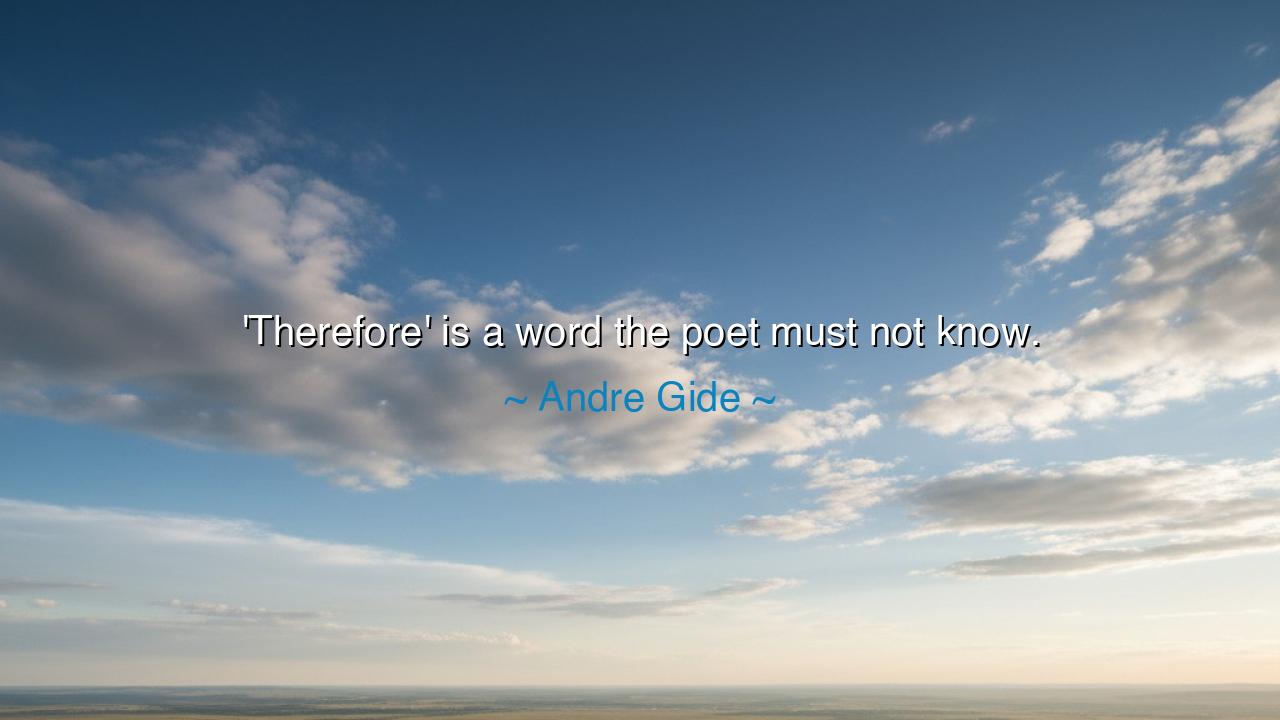
'Therefore' is a word the poet must not know.






In the words of André Gide, “‘Therefore’ is a word the poet must not know.” This utterance, sharp and enigmatic, strikes at the heart of what poetry is and what it is not. For to say “therefore” is to argue, to reason, to draw a logical chain from premise to conclusion. But poetry is not logic; it is revelation. It does not move step by step like a lawyer presenting a case, but flashes forth like lightning, illuminating all at once the hidden landscape of the soul. Gide warns us that when the poet becomes too rational, too didactic, the magic of poetry dissolves into mere discourse.
The word “therefore” belongs to philosophy, to science, to rhetoric—fields where argument reigns and reason must persuade. But the poet, Gide insists, should avoid such tools. The poet’s task is not to prove, but to evoke; not to explain, but to awaken. A poem that ends with “therefore” has already betrayed itself, for it has collapsed mystery into conclusion, wonder into instruction. The essence of poetry is suggestion, ambiguity, the shimmering sense that something has been glimpsed but not fully grasped.
We see this truth in the lives of the great poets. William Blake did not say, “Therefore, the innocence of the lamb is a symbol of divine purity.” Instead, he asked, “Little Lamb, who made thee?” The question, not the conclusion, was the power of the poem. Or consider Rainer Maria Rilke, whose verses call us not to a syllogism but to transformation: “You must change your life.” There is no “therefore,” no proof, only a sudden, searing command that bypasses the mind and pierces the soul.
Even in the ancient world, the greatest poets shunned logic in favor of vision. Homer does not reason that anger leads to destruction; he sings of Achilles’ wrath, and in the song the truth is revealed. Sappho does not prove that love is overwhelming; she simply describes its fire burning through her veins, and the reader feels the truth without explanation. Thus Gide’s wisdom is confirmed: poetry must not argue—it must reveal.
The deeper meaning of this teaching is that poetry belongs to a realm beyond reason. It speaks in metaphor, rhythm, image—languages that touch the heart where logic cannot reach. When poetry tries to be too rational, it loses its soul; it becomes essay or debate. But when it remains free of “therefore,” it becomes timeless, unshackled by the chains of explanation. It is this freedom that allows poetry to cross centuries and cultures, speaking to the inner life of all who encounter it.
The lesson for us, then, is to remember the limits of reason. There are truths too great to be captured in syllogisms, too mysterious to be reduced to conclusions. In our own lives, we must leave room for wonder, for beauty, for mystery that does not need to be solved. When we write, when we speak, when we create, let us not always rush to the “therefore.” Let us allow space for silence, suggestion, and awe.
Practically, this means cultivating the poetic spirit in all things. When you look upon a sunset, resist the urge to explain its colors with science alone; let yourself feel its mystery. When you read a poem, do not demand an interpretation that ends with “therefore”; let the images work upon you. And when you create, remember Gide’s charge: resist the tyranny of conclusion. Offer instead an open door, through which others may pass into their own discoveries.
Thus, Gide’s words endure as both warning and invitation: “‘Therefore’ is a word the poet must not know.” For poetry is not a chain of logic but a flight of spirit, not a courtroom argument but a vision sung. Let us then cherish mystery, resist easy conclusions, and honor the power of words that do not prove but reveal.






TDVan Thi thuy duong
Gide’s statement makes me think about the nature of poetry as a form of expression that doesn’t always need to make perfect sense. It seems like he's encouraging poets to let go of the constraints of reason. But does that mean the poem must exist purely in the realm of emotion or intuition? Can a poem still make an impact without any clear reasoning behind it?
NHAn Nguyen Ha
I see Gide’s idea as a call for a more visceral, instinctive form of writing, free from the confines of rationality. But can a poet truly discard logic? Even in poems that seem chaotic or abstract, there’s usually some hidden structure. Is the absence of 'therefore' a true reflection of the poet’s freedom, or is it just an illusion of freedom within a structured art form?
THTuan Hung
What Gide is really saying here might be that the poet should embrace the unpredictable, not try to tie everything together too neatly. Poetry is often about feeling and spontaneity, not about drawing clear conclusions. But can a poem really feel complete without any logical flow or sense of progression? Is it possible to have poetry that surprises without seeming disjointed or incomplete?
QT3721_Bui Quoc Trung
Gide's remark challenges the very structure of poetry. By suggesting that poets must not know 'therefore,' he seems to advocate for a style that avoids reasoning or justification. But can poetry ever be entirely free of rationale? How does one write a poem that is both free from logical constraints and still resonates with meaning for the reader?
DDaovanduc
Andre Gide's statement about the word 'therefore' is thought-provoking. It suggests that poetry should resist logical conclusions or forced connections. But can a poem truly exist without a sense of cause and effect, or is there always an underlying 'therefore' that drives the emotional or thematic progression? Is poetry more about exploring ambiguity and emotion than about following linear logic?